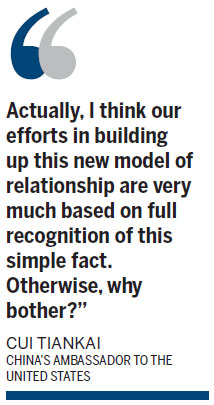US must cease biased remarks on China, warns top diplomat
Ambassador objects to comments by White House official at seminar
China's Ambassador to the United States Cui Tiankai cautioned US officials against making unconstructive comments about China, especially on certain sensitive issues such as tensions in the South and East China seas.
Cui made the remarks during a seminar on building a new model of a major power relationship held on Thursday at the Center for American Progress in Washington.
Cui said that it's not constructive for people working in the government to refuse to take a position on an issue, but then voice lengthy accusations about one party that are clearly biased and groundless.
He did not name US officials, but it was an apparent reference to a speech made at CAP a week ago by White House Senior Director for Asian Affairs Evan Medeiros, who blamed China for the tensions in the South and East China seas and made other references that Cui thought carried subtle subtexts.
While saying he fully shared many of the views expressed at the seminar - such as those emphasizing the importance of more regular high-level contacts between the two countries and the need for clarity, consistency and predictability - Cui said he may not see eye to eye with Medeiros on other issues.
Medeiros said at the earlier meeting that he has three messages for Chinese leaders, the first being that the US is strong and gaining strength at home.
Cui described the statement as a simple matter of fact. "The United States is the most powerful and strongest country in the world and will remain so for many, many years to come," he said.
"Actually, I think our efforts in building up this new model of relationship are very much based on full recognition of this simple fact. Otherwise, why bother?"
'Puzzling reminder'
The Chinese ambassador, who served as vice-minister of foreign affairs before taking the post in the US last April, said he was not sure there is a need to keep reminding people about US power.
"I don't know if this is simply intended to impress others or reassure oneself," he said.
Medeiros' second message was that the US is an incumbent power in East Asia: "In other words, we've been in Asia for over 60 years and we're going to be there for another 60 years and even longer."
Cui said the US presence, interest and influence in the Asia-Pacific is also fully and widely recognized. "We certainly welcome a constructive role for the US in the region," he said.
"At the same time, we have to keep in mind another simple and important fact: China is a Pacific country, and China is also an Asian country," he said. "So in this context, any attempt to manage or manipulate regional affairs at the expense of China's legitimate interest in the region cannot be justified, and indeed will be detrimental to the prosperity and stability in the region and eventually will serve nobody's interest."
Cui said he fully endorsed the third message, which was for China and the US to strive for more cooperation.
"We should aim at win-win cooperation, whether in the Asia-Pacific or elsewhere, on the basis of mutual respect," Cui said, adding that it is key to the success of the new model relationship.

"Fortunately our two presidents have already made the very important decision that we should work together for this," Cui said.
Tung Chee-hwa, former Hong Kong chief executive, also stressed the importance of maximizing cooperation between the two nations.
"After all, the Asia-Pacific is where frictions are most likely to occur between the two countries, and also where mutual benefits can multiply many, many times for many people," said Tung, now chairman of the China-US Exchange Foundation, which released a report - together with CAP on Thursday - entitled "US-China Relations: Towards a New Model of Major Power Relationship".
The report, a team effort by Chinese and US experts, provides detailed guidelines for the two nations to maximize cooperation while narrowing and managing their differences in a bid to achieve the goals called for by President Xi Jinping and his US counterpart Barack Obama during their informal summit in Sunnylands, California, last June.
Quoting a US official, Sandy Berger, the former US national security advisor, said the best description for the bilateral relationship is that it is "big, complex, increasingly mature, and no one issue can set back other issues from going forward".
Berger said both nations have to look at their strategic doctrines to make sure they are not creating a security dilemma in which "what we do to protect ourselves actually makes China feel more threatened and what China does to protect itself makes us feel more threatened".
Berger said more military-to-military dialogue at both low and high levels to address strategy, capabilities and perhaps limitations will be helpful.
chenweihua@chinadailyusa.com
(China Daily 02/22/2014 page8)














